Unlike with Airbnb, Booking.com, or Vrbo, you cannot just go to a sign-up page and get your vacation rental listed on Google’s Vacation Rentals product. If you are an individual property owner, you need to go through an intermediary, such as a channel manager or a niche listing site. If you run a property management company with fewer than 5,000 properties, you need to pick one of Google’s approved connectivity partners. If you run a large vacation rental management company with a tech developer team, you can integrate directly with Google. Let’s review these options in detail.
In this series of articles about Google’s Vacation Rental listing solution, we’ve seen what these listings looked like in Google Travel and Search results and why you may want to list with Google’s vacation rental product (hint: something close to free direct bookings, with some caveats).
Now, you may think: How do I get my property management company listed on Google? How can a vacation rental owner hope to see their property listed on Google Trips?
First option: Do nothing – One of your existing listing sites may already have put your property on Google Vacation Rentals
When Google launched its product for vacation rentals, it had already supply from Vrbo, Agoda, and Expedia, among others. So, if you had listed your vacation rental property with one of these OTAs, then it could show up in Google Trips and within Google’s search results.
For no additional fee, you can get traffic and bookings from Google Travel, via these listing sites.
Now, the issue is that some of these listings have come and gone from Google Travel. For example, Airbnb joined Google’s meta-search solution for vacation rentals at some point and then left it. Vrbo was an initial partner but then left as it bets on strengthening its own brand instead. Same thing for Booking Holdings brands, as vacation rentals from Agoda and Booking.com were visible on Google for some limited time.
Yet, TripAdvisor and its brands, such as HolidayLettings, are at the moment visible among Google Travel’s vacation rental listings.

It does not mean that the big OTAs will not come back to Google Travel. After all, Expedia Group brands (e.g., Expedia, Hotels.com) and Booking Holdings brands (e.g., Booking.com, Priceline) are present in Google Hotels. Yet, it seems that Airbnb, Booking, and Expedia are not willing to help Google make its product relevant thanks to their supply in a year when people anticipate high demand for vacation rentals and tight supply in key areas.
As of early April 2021, niche listing sites such as luxury-focused Plum Guide and Homes & Villas by Marriott International were visible on Google Travel. So, if you have a property listed them, you may see it.

Interestingly enough, another meta-search engine, FindHotel, is visible on Google Travel. FindHotel pulls its listings from the likes of …. Booking and Expedia, so Google may have found a way to get your listed visible after all.
We’ve seen that, for the moment, advertising vacation rentals in Google Travel is free. Some also see it as a promise for more direct bookings. Yet, if your property is visible on Google thanks to a listing site such as Airbnb or Plum Guide, you still have to pay for their service fee. The customer data also belongs to the listing site, as the traveler books and pays on their platform.
Second option: Pick an approved connectivity partner. Yet, you may not be able to send Google users directly to your own website
To get closer to the perspective of free traffic and more control on guest data, you may want to bypass listing sites to get your properties on Google. For most vacation rental owners and property managers, it means using a channel manager (i.e., a “connectivity provider”) to do so. You may incur integration costs and some fees from your channel manager when using them to connect to Google.
Google writes: “If you have fewer than 5,000 properties, before considering a direct integration, we strongly recommend working with one of our connectivity providers listed below to get your properties shown on Google.”
This is a list of Google Vacation Rentals’ approved third-party integration partners, as of early April 2021:
- Avantio
- Bluetent
- Bookiply
- Direct
- Futurestay
- Kross Booking
- NextPax
- Rentals United
Note that some of these channel managers do not work with individual vacation rental owners (e.g., NextPax and Rentals United). Some do, such as Futurestay.
Also, note that Google’s traffic may or may not come directly to your website. This is why you can see on Google’s vacation rental meta-search the brand of some channel managers such as Rentals United, Bluetent, and Bookiply.
Direct traffic to your website from Google’s vacation rental product
Channel managers allow you to list your properties directly with Google if your company has more than 500 properties. Your brand is visible in Google’s search results and the traffic from Google is sent out to a landing page on your own website.
Here a few screenshots to illustrate this booking path from Google to the website of Interhome, a leading European holiday rental company. Behind the scene, channel manager NextPax connects Google to Interhome.
1- Interhome within Google vacation results in Google Travel

2 – Listing page on Google detailing an Interhome property
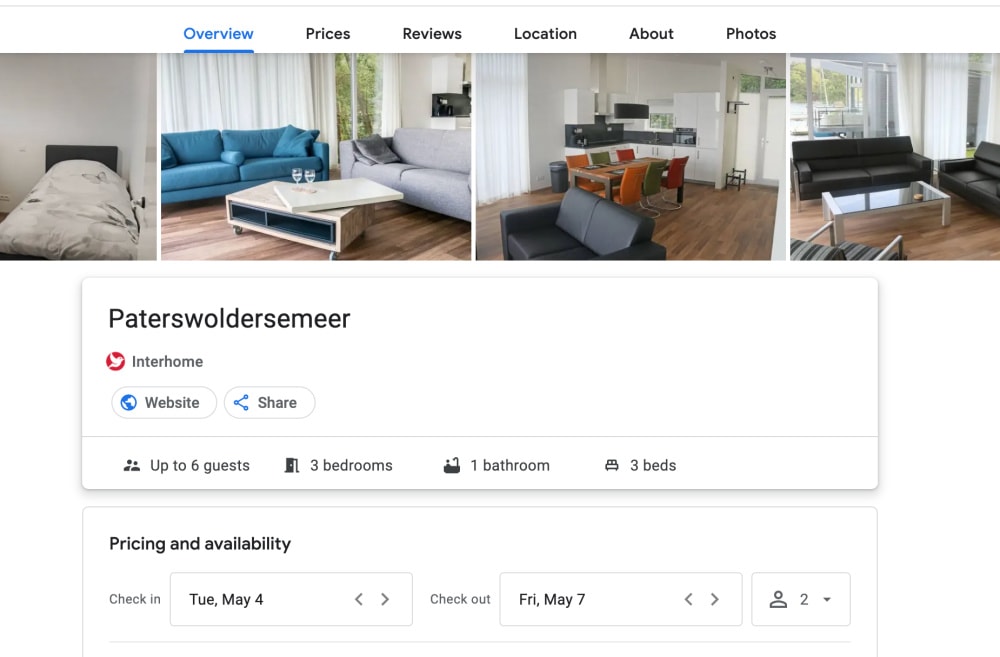
3 – The same property on the related Interhome landing page
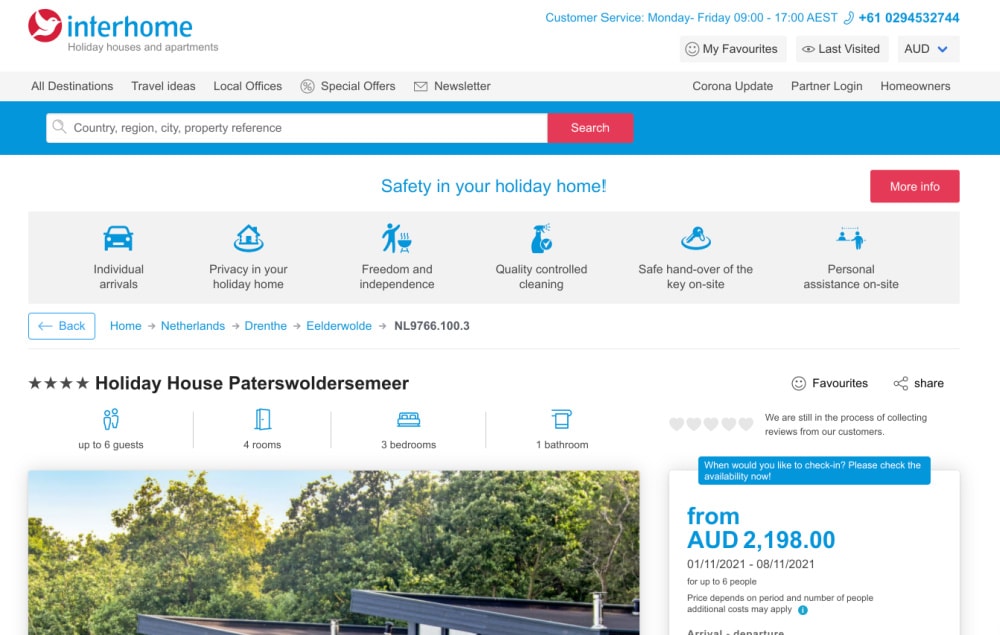
Traffic sent out to the connectivity provider, but you are the merchant of record
If your property management company has fewer than 500 properties, then channel managers can still get your listings on Google but they will host them on under their own umbrella brand. Their brands are visible in Google Travel and a user will land on a page hosted by them to finish their bookings. Here, the Google user does not land on your website, but you are the merchant of record.
We’ve seen examples of properties listed under brands such as such as Rentals United, Bluetent, Futurestay and Bookiply. We understand that it is Google’s own requirements, not a technical issue, that forces channel managers to group listings of medium to small property managers under their brand.
Here’s how Rentals Unites explains it: Rentals United creates and hosts your Google vacation rental listings for you. They belong to you and you are the merchant of record. Bookings from Google are processed via our Book Direct pages, which include your company name and details. Thanks to this, many of our customers have seen an increase in their website traffic indirectly.
Here a few screenshots to illustrate this booking path for a cabin rental belonging to Bear Tracts. We can guess that they are using Bluetent to called Rezfusion Boost. Notice that the brand listed on Google is “Vacation Rentals by Bluetent”. The landing page to book the cabin is hosted on the rezfusion.com domain name.
1 – The property is branded as “Vacation Rentals by Bluetent” on Google
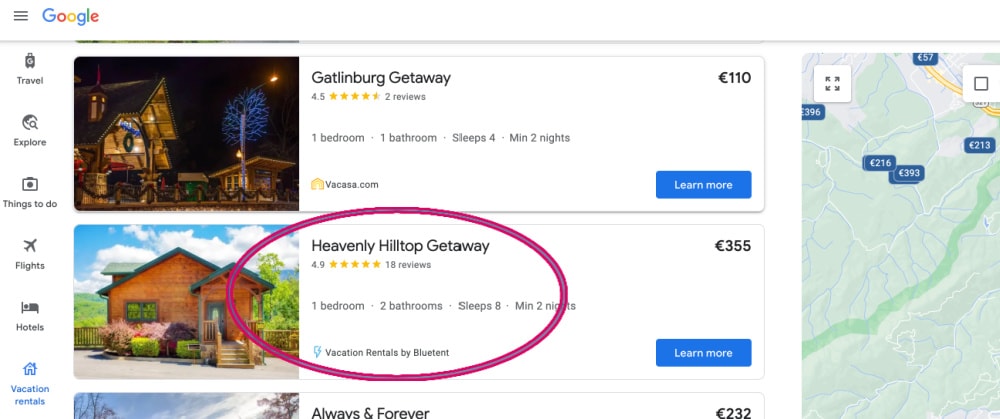

2 – Listing page on Google detailing the cabin
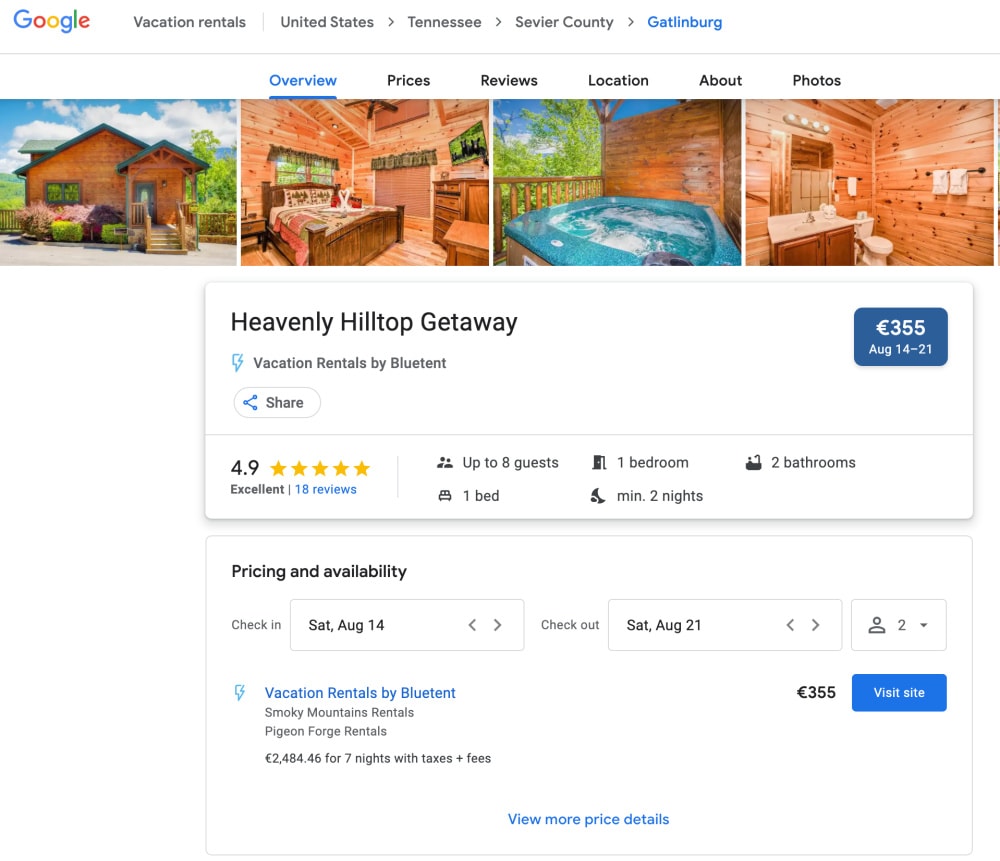
3 – The same cabin on a RezFusion.com landing page
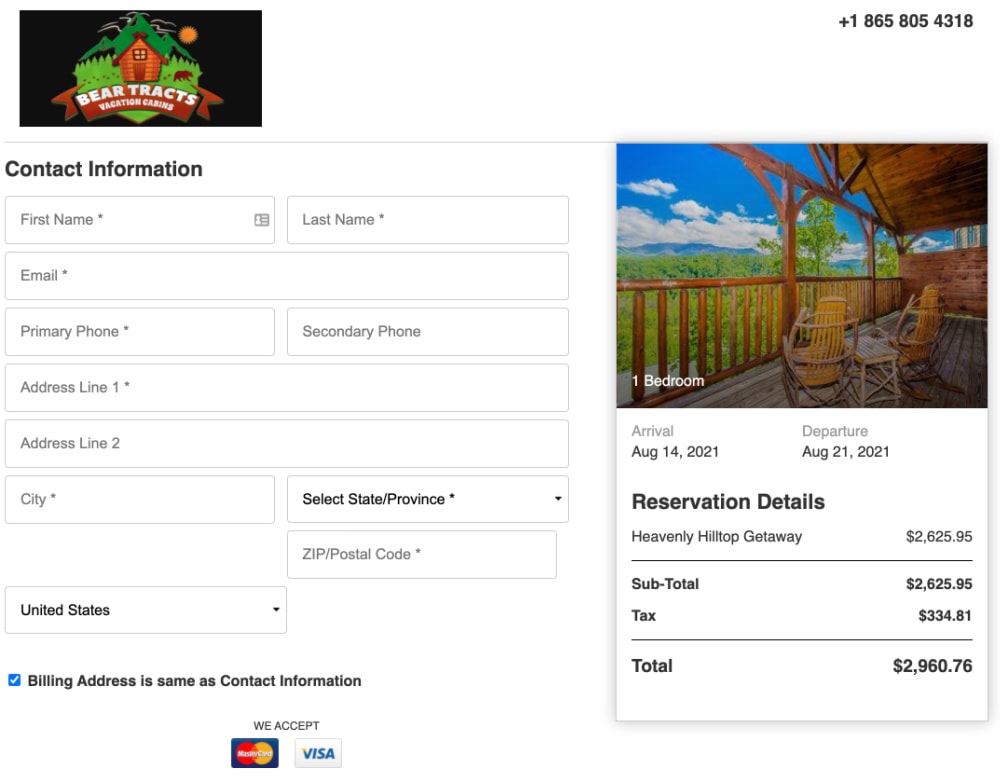
Third option: Bypass channel managers and create your direct integration with Google’s vacation rental solution
If you have more than 5,000 properties under management and your tech team can handle integrating XML feeds, then you can build a direct integration with Google Vacation Rentals.
Companies like Vacasa and Turnkey have such a Google Travel direct integration. To get started, a property manager must fill in this Google Vacation Rentals Interest Form. If they qualify, then Google will back to them and assign an account manager.

Google states: If a partner is deemed technically capable, a technical account manager at Google will reach out to begin onboarding. Based on the status of the partner’s technical capabilities, discussions will involve developing a plan to fulfill requirements needed to onboard, as well as setting an estimated timeline for the completion of these tasks.
To understand Google’s requirements, let’s have a sneak preview of some of these questions. Google is asking questions about your company and your tech capacities:
- Questions about your company:
- What is the nature of our business?
- Online travel agency
- Connectivity provider (booking engine, CRS, PMS, channel manager, etc.)
- Property management company / Vacation Rental management company
- Marketing agency
- Metasearch engine
- How many vacation rental properties do you represent?
- For vacation rental properties, please estimate what percent of your inventory is the following: urban vs rural
- Can you provide an estimate of how many brands you manage? *
- What region does your inventory represent? *
- What is the nature of our business?
- Questions about your technical capabilities:
- Can you provide a list of amenities (such as Wi-Fi, air conditioning etc.), plug at least 5 images for each of your individual properties? *
- Are you aware of how to integrate price feeds with us? (Price feeds: https://developers.google.com/hotels/hotel-ads/xml-reference/transaction-messages)
- Can you follow the instructions in this Hotel Ads guide to construct dynamic landing page URLs? (https://developers.google.com/hotels/hotel-ads/dev-guide/pos-overview)
- Can you manage and update Landing Page settings? (https://support.google.com/hotelprices/answer/9457428?hl=en&ref_topic=9144475)
- Do you provide instant booking for at least part of your inventory?
Given the inventory (5,000+ properties) and the tech requirements, only very large property management may look into direct integration. They will not depend on a 3rd-party channel manager’s tech and fees, but building and maintaining a direct integration can be costly. They will also be able to cater to the specific needs of their portfolio. They will also be able to be in direct contact with Google’s product team.
Google Vacation Rentals FAQ:
Can I list my vacation rentals on Google directly?
Yes, if you have more than 5,000 properties and if your tech team can handle XML feeds and APIs.
Does it work like Google Hotel Ads? Do you allow me to bid for placement?
Unlike with Google Hotel Ads, advertising with Google’s Vacation Rentals solution is free, for the moment. If you are integrating directly with Google, you will have to create a dedicated campaign in Google Hotel Ads to track your performance, but Google vacation rental listings are featured for free.
Do I need to pay Google a commission?
Google doesn’t charge you for sending travelers your way (at the moment – April 2021). If you list your vacation rental on Google, you’ll be getting direct bookings for free (note that if you are using a channel manager, you may incur related costs to use their service to integrate with Google).
Can I send traffic from Google vacation rental listings to my own website?
Yes, if you are a large property manager like Vacasa that can integrate directly with Google. If you use a channel manager, some solutions do send traffic straight to your website, while others create and host a special listing for you on their website.






